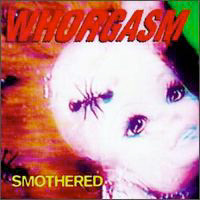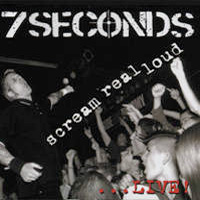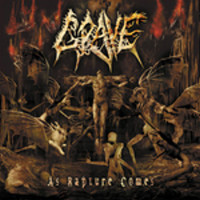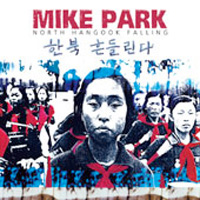 Mike Park
Mike Park
North Hangook Falling (Asian Man/Sub City)
An interview with Mike Park
By Tim Den
There’s good reason why Mike Park is spoken of in the same regard as Ian MacKaye these days. Having been in punk rock bands since his early teens, Park launched two labels (Dill and Asian Man), founded an influential band (Skankin’ Pickle), started a massive community-minded tour (Plea For Peace), and remained D.I.Y. even as his projects gained both financial ground and respectable popularity (Asian Man’s roster combined has sold over one million records). Not bad for being practically the only Asian face in independent music.
North Hangook Falling, his second solo album, reveals why he’s so admired. Over acoustic folk songs that echo Ted Leo, Park tackles ethnic dilemmas and matters of the heart, his “everyman” voice as comforting as it is relatable. When he sings of disappointing his traditional father in “Asian Prodigy,” the weight of parental expectation is heavy on your shoulders, not because you share the exact same circumstances (though I myself do, to a certain extent), but because growing up to make your parents proud is as universal as the sound of beautifully played chords. Park’s melodies are never sullen in bringing these messages of hope, discovery, and redemption; instead, they’re subtly joyous and soothingly catchy, picking you up just as you’re feeling down.
North Hangook Falling‘s songs will speak to your heart, and its lyrics will speak to your head, while Park’s hands-on approach to conducting business and personal matters will have you applaud him for truly being a leader in independent music.
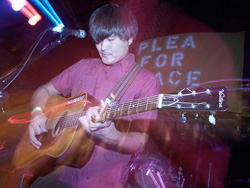 Has your music always focused on Asian-American issues?
Has your music always focused on Asian-American issues?
My first band back in high school was called YCWA, meaning Yellow Chinks With Attitude. (chuckles) This was around ’84. Everyone in the band was Asian and we all went to the same high school, which was all White. We all shared the same sense of humor, so yeah, it’s always been a part of my music. We were 14 years-old, just goofing off. When I started Skankin’ Pickle, my songs for the band were an extension of those early years: I wrote about Asian-American issues that I thought were important. I think it’s good to have someone of our heritage out there to be a face others can identify with. There are a lot of Asians in hip hop, but not a lot in rock. Between you and me, we could probably think of a few Asians in underground rock, but I doubt a White kid in Middle America kid could name one.
When you started out as a an Asian punker, did you encounter a lot of racism?
You know, I was so young that I couldn’t tell. I’m sure there were comments made, but I didn’t notice or care. I was fearless, or maybe too naïve. The racism started to be noticeable when Skankin’ Pickle started. Back in the late ’80s, ska was different. There were a lot of skinheads! Racist or not, skinheads were always trouble. (chuckles) We played a place in South Florida around ’93 before about 400 kids, and the entire front row were White Power skinheads. They kept Seig Heiling me. The funny thing was that the crowd didn’t stand for it! I had to pull the skinheads over the barricade so they wouldn’t get their asses kicked.
I grew up in South Florida and went to a lot of shows in Ft. Lauderdale, aka Nazi Skinhead City.
One other time in Baton Rouge, LA, there were not that many people at the show, but I got White Power skinheads Seig Heiling me, too. The whole White Power skinhead culture confuses me. In the early ’90s, Skankin’ Pickle played a show in Denver, and afterward, an old guy came up, said “good show,” and started talking to me. I was getting weirded out cuz he had White Power tattoos all over him. I was like “wait… huh?” I’ve also seen Black skinheads hang out with White Power skinheads, which further deepens my confusion.
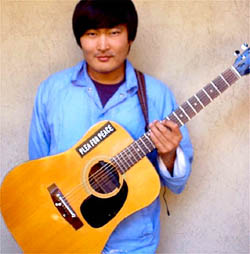 You’ve come rather far, both as a musician and as a label owner. How is Asian Man doing these days?
You’ve come rather far, both as a musician and as a label owner. How is Asian Man doing these days?
It’s doing well! I think the biggest misconception about Asian Man is that we’re a “big label.” In reality, there are two employees, and we work out of my parents’ garage. It’s small, it’s meant to be small, it’s forcibly small, but under those guidelines, we do very well. I just try to keep grounded. Kids trip out cuz I answer the phone, which just baffles me. Why should I be put on a pedestal? In the end, it’s important to me that I enjoy what I do and remain hands-on.
You’ve been touring globally for quite some time now. Have you seen any changes in indie rock demographics as far as Asian-Americans go?
Uh, not really. (laughs) Maybe in the big cities like New York or San Francisco, but I was recently out with Alkaline Trio, which was a big tour, and we did sort of secondary markets. We played St. Louis, and out of 1600 kids there were maybe seven or eight Asian kids.
Why do you think that is?
I think it’s because Asian-American kids don’t have a figure they can relate to in rock. If, for instance, someone like them became Good Charlotte huge or something, then more kids would come out, because it would show them that they can do this. But corporations are not investing in Asian faces because there’s no track record of them selling. Still, you never know, it might happen one day.
My father still insists that I could never succeed in music because I have “an Asian face.”
He’s kind of right, for now. But that also depends on what his definition of “success” is. I could walk into a restaurant right now and ask people if they know who I am. Of course they wouldn’t. But I can ask “do you know who Green Day are?” and they more than likely would. But I consider myself successful, as a musician and a business owner. It all depends on your perspective.
Like you said earlier, there are a lot of Asians in other genres like hip hop, classical…
Yeah, take classical music for example: It’s almost the norm to see an orchestra with mostly Asian faces. But you flip the tables on that and see no African-Americans, because there’s no one in classical music for young African-Americans to look up to. Same with sports: 10 years ago, it would’ve been crazy to think of African-Americans in golf. But now there’s Tiger Woods!
How did your recent tour of living rooms go?
Honestly, it was probably the most enjoyable tour I’ve ever done. It just flew by! Normally, touring is a bit tough, but I was able to bypass all the usual obstacles this way. Think about it: On a regular tour, you have stuff like soundcheck and load-in and finding a place to stay, but with this tour, I’d get to the house by 5 pm, to set up, all I had to do was pull out my guitar, and I’d stay there ’til I had to leave the next day. Basically, when I arrive, I’m good for the night!
Each house was different. Obviously, every night I’d take whatever amenities were offered to me, but some of the places were amazing! Swimming pools, trampolines…
Tell me a bit about the upcoming Bike For Peace fundraiser.
Initially, the idea was to get a bunch of people together to bike down the West Coast and raise money for a youth/community center here in my hometown of San Jose, CA. But, man, it’s been really hard getting funding. We’ve written at least 100 grant proposals, but so far, we’ve yet to receive a dime. It’s only been donations from friends, family, or anonymous people who’ve heard about it, but obviously nothing from mainstream corporations. It’s extremely frustrating.
How much money do you think the center will need?
At least a few hundred thousand dollars. I think, for the time being, I might just start a makeshift space somewhere to have shows. Put up a stage, a PA, just so at least there’s something.
I’ve also been training (riding bikes) a lot. It’s very time consuming. Sometimes, I wonder if I should just give up, but, as with most things I do, I’m just gonna do it and it will hopefully work out.
(www.asianmanrecords.com, www.subcity.net)

